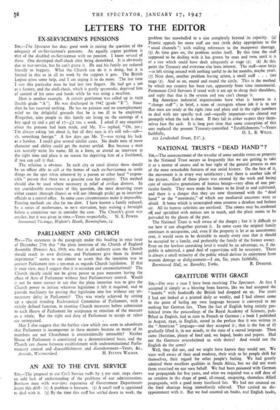NATIONAL TRUST'S " DEAD HAND " ?
Snt,—The announcement of the tra.isfer of some notable estate or property to the National Trust occurs so frequently that we are getting to take it as a matter of course and to lose sight of the general process as one of the most remarkable features of our social history. On the face of it, the movement is in every way satisfactory ; but there is another side of the picture. Each of these places was created by the work and loving care of successive generations of human beings—very often of one par- ticular family. They were made for homes to be lived in and cultivated, and there is a danger that they are now threatened with the "dead hand" or the " mortmain,".of which our mediaeval ancestors were so afraid. A home which is unoccupied soon assumes a desolate and forlorn air. All its human activities are sterilised. The rooms may be. cordoned oft and sprinkled with notices not to touch, and the place seems to be pervaded by the ghosts of the past.
The National Trust is well aware of the danger ; but it is difficult to see how it can altogether prevent it. In some cases the original family continues in occupation, and, even if the property is let at an uneconomic rent, it would seem to be desirable in nearly every case that it should be occupied by a family, and preferably the family of the former owner. Even on the lowliest caretaking level it would be an advantage, as, if the public is admitted, a good deal of supervision will be necessary. There is always a small minority of the public which derives its enjoyment from wanton damage or disfigurement.—! am, Sir, yours faithfully,
Burntwood Hall, nr. Barnsley, Yorks. R. DYMOND.


































 Previous page
Previous page